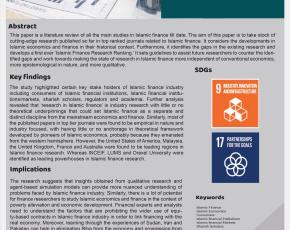Abstract
This paper is a literature review of all the main studies in Islamic finance till date. The aim of this paper is to take stock of cutting-edge research published so far in top ranked journals related to Islamic finance. It considers the developments in Islamic economics and finance in their historical context. Furthermore, it identifies the gaps in the existing research and develops a first ever ‘Islamic Finance Research Ranking.’ It sets guidelines to assist future researchers to counter the identified gaps and work towards making the state of research in Islamic finance more independent of conventional economics, more epistemological in nature, and more qualitative.
Key findings
The study highlighted certain key stake holders of Islamic finance industry including consumers of Islamic financial institutions, Islamic financial institutions/markets, shariah scholars, regulators and academia. Further analysis revealed that ‘research in Islamic finance’ is industry research with little or no theoretical underpinnings that could set Islamic finance as a separate and distinct discipline from the mainstream economics and finance. Similarly, most of the published papers in top tier journals were found to be empirical in nature and industry focused, with having little or no anchorage in theoretical framework developed by pioneers of Islamic economics, probably because they emanated from the western hemisphere. However, the United States of America, Malaysia, the United Kingdom, France and Australia were found to be leading regions in Islamic finance research. Whereas INCEIF, LUMS and Drexel University were identified as leading powerhouses in Islamic finance research.
Implications
The research suggests that insights obtained from qualitative research and agent-based simulation models can provide more nuanced understanding of problems faced by Islamic finance industry. Similarly, there is a lot of potential for finance researchers to study Islamic economics and finance in the context of poverty alleviation and economic development. Financial experts and analysts need to understand the factors that are prohibiting the wider use of equity-based contracts in Islamic finance industry in order to link financing with the real economy. Moreover, learning through the experiences of Sudan, Iran and Pakistan can help in eliminating Riba from the economy and progressing from dual financial system to a fully Islamic one.













